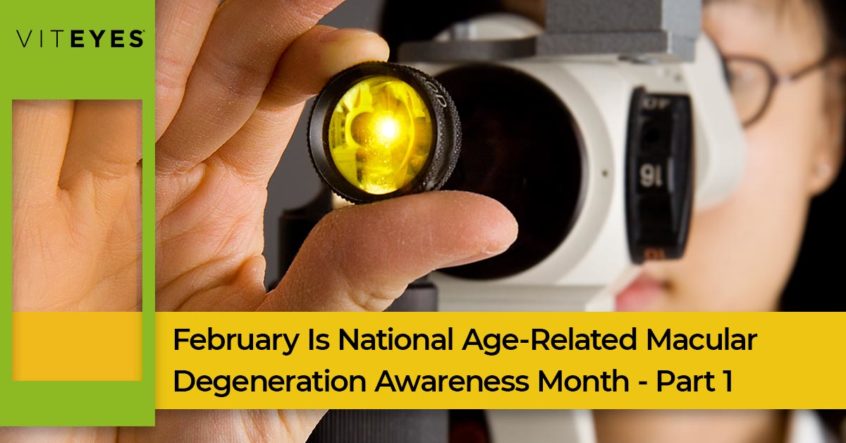Each month, the American Academy of Ophthalmology recognizes an important eye health topic to dedicate education and screening efforts toward. The idea is to help raise awareness about specific conditions and encourage people to think about preventable eye problems to take action now. February is dedicated to age-related macular degeneration and bringing awareness to how people can begin prevention efforts and screening now, and educating people on what can be done to protect against deterioration of vision. Join us in today’s post as we explore age-related macular degeneration and what you can do to reduce your risk.
February is dedicated to the topic of age-related macular degeneration (AMD) because it is an important health topic that affects more than 11 million Americans and is the leading cause of irreversible blindness and visual impairment in the world. More importantly, the number of people suffering from macular degeneration, on its current path, is expected to double by 2050. While age is the primary risk factor for AMD and the population of the world is aging thanks to medical and technological advances, it is critical to help slow the progression of the disease and save the sight of more than 22 million aging Americans. Before we can talk about prevention and treatment, let’s take a look at what AMD is.
What is Macular Degeneration?
There are two forms of macular degeneration, wet and dry. Wet macular degeneration is less common, representing only about 10% of diagnosed AMD cases, but can be more serious than dry, and results in nearly 90% of cases leading to blindness. Wet macular degeneration is an advanced form of AMD and is always preceded by dry macular degeneration. Dry macular degeneration is the progressive breakdown of light-sensitive cells in the macula. AMD is a complex disorder where protein-lipids called drusen deposit underneath the retina, disrupting the retina and allow abnormal blood vessels to grow. If these blood vessels grow into the macula, it causes loss of central vision. This irreversible damage leads to the loss of sharp, fine-detail, straight-ahead vision, making it difficult to read, write, drive, or recognize people or objects. Many people also have difficulty seeing colors and complain of a blank spot in the center of their vision. Symptoms of AMD may present as:
- Difficulty reading in low light.
- Reduced ability to recognize faces.
- Blurred vision when reading.
- Slowed recovery of vision after exposure to bright light.
- Colors appearing faded.
- Hazy or less-defined vision.
- Blind spots.

What are the risk factors for AMD?
While AMD is irreversible, there are certain factors that make people more susceptible to developing the disease. Age is the primary risk factor and AMD mostly affects those over the age of 60 (however, onset may be sooner). Some other risk factors include:
- Lighter eye color.
- Genetics and a family history of macular degenerations.
- Race — Caucasians are more likely to develop AMD than any other race, especially those with blue or hazel eyes.
- Smoking.
- Diet high in processed food and low in fresh vegetables.
- Obesity.
- Hypertension — increases the risk of macular degeneration by 50%
- Sunlight or bright light exposure without the use of protective eyewear.
- Gender — females are at a much higher risk of developing AMD.
AMD is a serious disease, threatening the eyesight of those afflicted. But there is hope! Stay tuned for part two of this series where we will continue our AMD discussion with ways you can help reduce your risk, treatment options, and the future of AMD.
At Viteyes, we help people protect and support their vision to keep life in focus. We aim to be a resource for eye health education as well as an online eye vitamin company. We offer eye supplements that support optimal eye health with natural ingredients. To learn more about macular health and macular degeneration, visit our online resource for these topics today.
